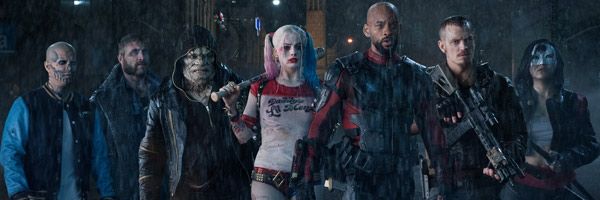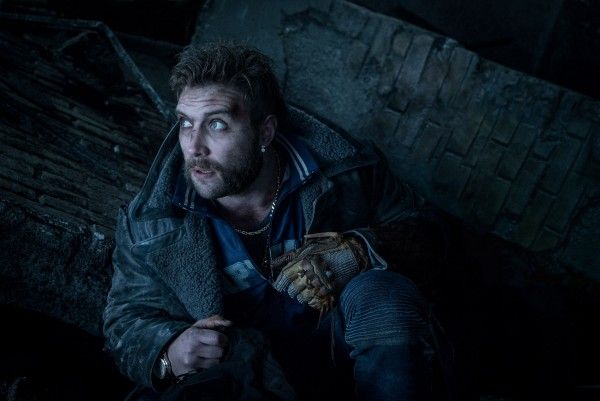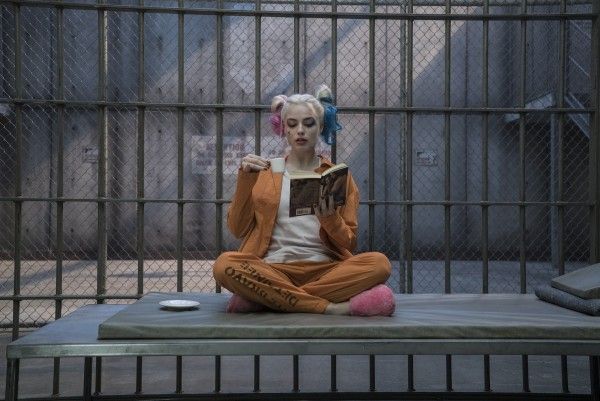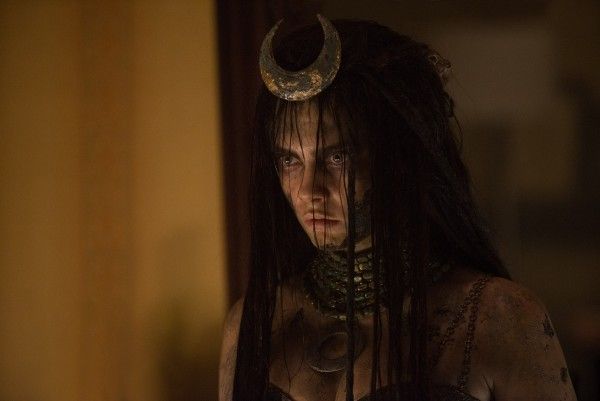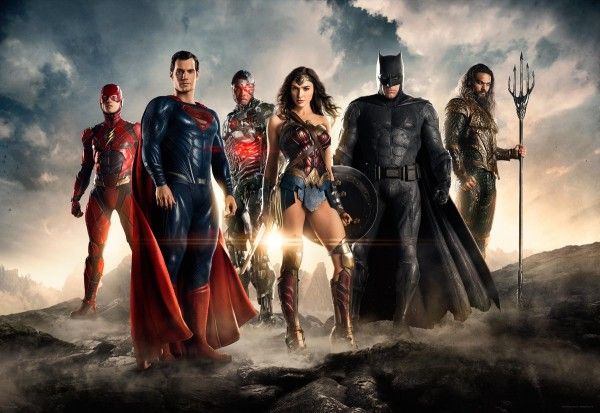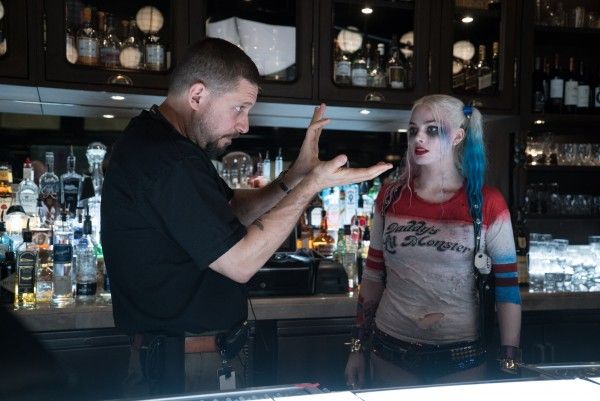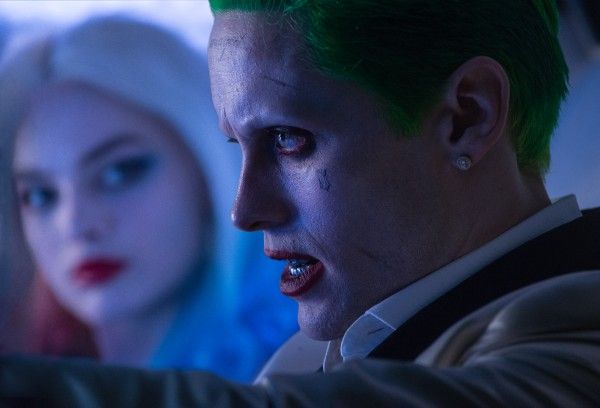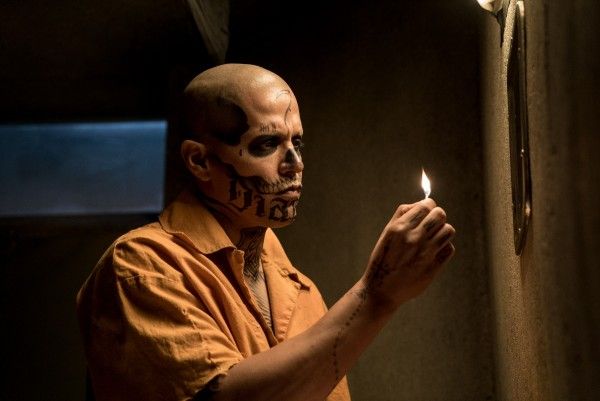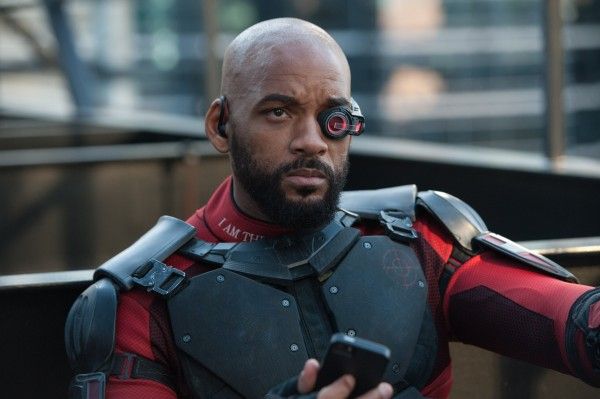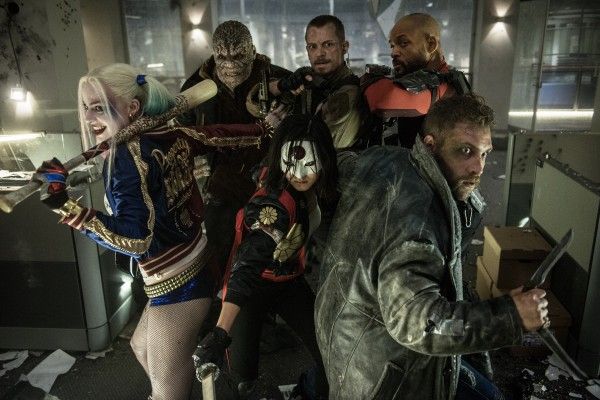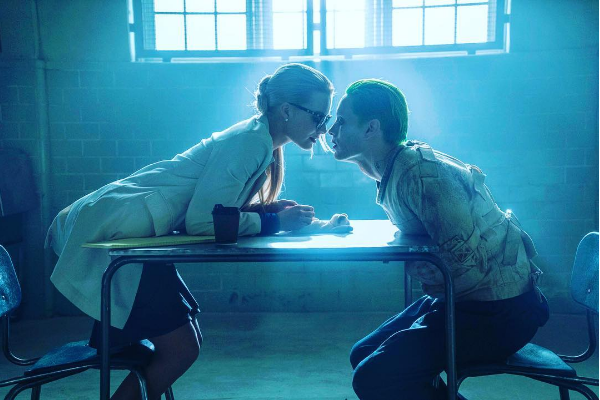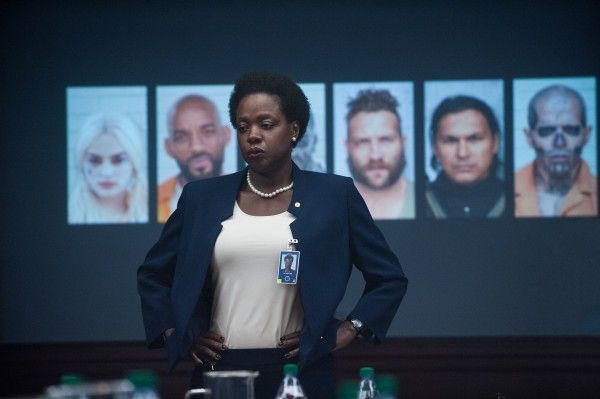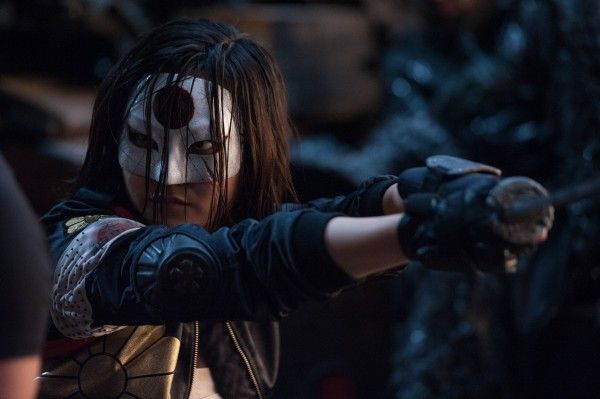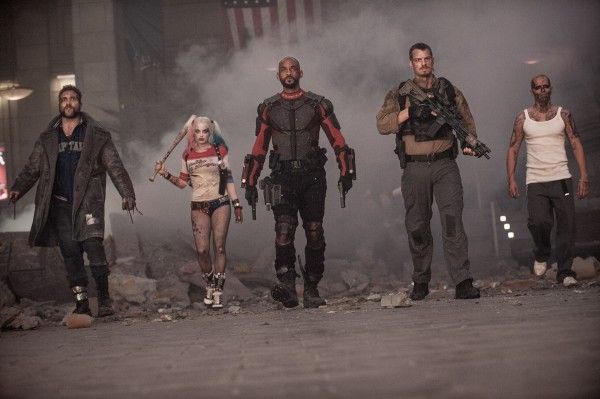Suicide Squad was a ballsy move. Making a newly introduced team of villains the core of the third film in a burgeoning universe is a risky, laudably adventurous creative decision. As such, the hype surrounding Suicide Squad has been peak from the beginning, only growing with the bold choice of David Ayer as director and an A-list cast. From the set photos on the streets of Toronto to the leaked Comic-Con sizzle reel, each new reveal added fuel to the fire, with excitement officially going overboard after the release of three impeccably cut trailers.
Now, Suicide Squad is finally here and it's time to sort through the pieces. Reception has been divided, but ultimately, whether you love it or hate it, the unavoidable fact is that Suicide Squad is a narrative piecemeal that never fully fulfills its promise. You might have fun with it (like I did) or love the characters (like I did), but there is a lot of unresolved material left on the table. As usual, I've set to pondering these lingering questions as I look back on Suicide Squad's faults and accomplishments, and the questions it poses for the future of the DC Extended Universe. Let's scratch our heads and dig in together as I break down the biggest questions that need answering below.
1. Why Did Captain Boomerang Come Back?
So, we all saw that part where Boomerang abandoned the group at the bar and then immediately marched back into the Squad like a hero for no goddamn reason, right? For a while there, it seemed like Jai Courtney was finally going to have his moment in the sun with Suicide Squad. His snarky goofiness and general DGAF attitude made him a standout in the trailers, but unfortunately what we saw in the trailers was basically the sum totality of his character. Courtney has stated in multiple interviews what a piece of shit Digger Harkness is (hence why he would run out on the group the second Rick Flagg says they're free to go), but that doesn't really come through in the film so I'm chalking this one up to deleted scenes. That said, cutting whatever happened between the moment he ran out of the bar and the moment he walked back on screen leaves a pretty blatant narrative gap that underserves both Boomerang and the idea that the team has become a family unit.
2. What's Next for Harley Quinn?
Harley is the only member of the Squad who already has a standalone movie in the works, and by the end of the film, it's easy to see why. When The Joker finally succeeds at breaking Harley out of prison, her story is set on a different path from the rest of the Squad, who are still locked up under Waller's watch. What comes next for Gotham's maniacal queen of the criminal underground after The Joker busts her out of Belle Reve? I wrote at length why I feel Harley was underserved by Suicide Squad's narrative, so hopefully her solo film will offer more of a deep dive into her and The Joker's relationship while also offering an opportunity for her to break off on her own. And, I don't want to get my hopes up too high, but could there be a better opportunity to introduce her BFF Poison Ivy? One thing's for sure, Margot Robbie's performance was a knockout and she deserves a film that will give her the opportunity to watch the world burn in that kooky, carefree way that's made her such an enduring fan-favorite.
3. Why Couldn't Enchantress Just Take Her Heart Back?
Of all the confusing things in Suicide Squad, Enchantress' ill-defined abilities may take the cake. She's an extremely powerful witch, but she can only possess June when she's called upon (maybe,kinda), and once she's in control she can essentially go anywhere and do anything...except get her damn heart back. When Enchantress takes over June's sleeping body, the first thing she does is jump into Amanda Waller's home and immediately, effortlessly surpassing Waller's security system to retrieve her brother's vessel. Why then, couldn't she just magic her hand into that containment box, grab her heart and snap Waller's neck on her way out? Seriously though, why didn't she kill Waller? That makes no sense at all. Unfortunately, not much about Enchantress does. She's a standard model big bad with shoddy motivation and poorly defined powers that never add up to much.
4. Where The Hell Are the Actual Heroes?
So, this is one of those questions that always comes up in a superhero movie? Why isn't so and so there to help out when their superpowered buddies are up against the biggest threat of their life. You just eventually start to accept that each superhero more or less operates in their own little bubble until some next-level shit (ie Doomsday, Thanos, etc) pulls them together as a team. But the circumstances are a little different in Suicide Squad because there's not a single hero who shows up to save Midway City (and presumably the world, though the consequences of Enchantress' trash-dance are pretty unclear). Instead, it's only the villains who show up to save the day when military forces have been overcome by Enchantress' bubbly-faced mutant people (again, her powers aren't that clear). Are we meant to believe that the future members of the Justice League totally dropped the ball here? Sure, Superman is dead-ish, and I can buy Aquaman and Wonder Woman chalking this one up to "not my problem," but Batman and The Flash are narratively intertwined with our anti-heroes, yet they only appear in flashbacks. What's more, The Flash can be anywhere in a moments notice, so why would he stand by and let Enchantress work her strange magic?
5. What Was David Ayer's Original Vision?
David Ayer told us that the version of Suicide Squad that is in theaters is his cut, and while he probably did sign off on it, it seems almost undeniable at this point that the film we ended up with is a product of compromise. Recent reports have stated that Warner Bros. became concerned that the film's tone was too far removed from the irreverent, fun-filled bash the trailers promised, leading to multiple versions of the film that were screened for test audiences. If rumors of deleted scenes and reports from the set are to be believed, Suicide Squad was once a much darker movie (and seemingly one that made a bit more sense). There's a sense of cut and paste, especially at the beginning of the film, that leads to a choppy narrative experience and a consistent feeling that we're missing something we're supposed to know. Suicide Squad also reportedly had a rushed development process, so it's likely that some of the narrative issues run deeper, but recutting the film undoubtedly only exacerbated those existing problems. I can enjoy Suicide Squad well enough for what it is, even in its somewhat slapdash form, but I'm desperately curious what Ayer's original vision was. Unfortunately, if he's claiming the theatrical release as his cut, it seems unlikely that we'll ever get to see that version, however, Warner Bros. did very well for themselves with the Batman v Superman Ultimate Edition, so perhaps there's an undiluted cut in our future. At the very least, I hope we get to see some of the deleted scenes that landed on the cutting room floor.
6. What's Going on with The Joker?
After a whole lot of hype and an excruciating parade of stories about Jared Leto's deep method tactics, we have finally met the new incarnation of The Joker. And while it's not quite much ado about nothing, it's definitely much ado about...not very much. The Joker is a side-tangent to Suicide Squad's, at best an unnecessary thrill and a worst a detrimental distraction from the already too-large ensemble. Worse, even after all that hullaballoo, Leto's performance is just sort of fine. Many folks have been hotly divided on his incarnation of the Clown Prince of Crime, finding him either a refreshing reinvention of the classic character or a hollow, irritating affectation of villainy, but I fall more in the meh territory. He's serviceable and there's potential, but he feels like a whole lot of sizzle without much steak. According to Leto, The Joker ultimately lost a lot of screentime in the final cut, so it's possible there's more hiding under the surface. And I really hope so, because Leto's version of The Joker has a nastiness and panache, not to mention a peculiar allure, that could serve as a livewire in the right script. There's much to be explored in his history with Batman, which has only been alluded to in Batman v Superman and Suicide Squad, and hopefully when they fill in those missing pieces we'll get a sense of his character and ethos instead of pure personality.
7. Wait, What the Fuck Happened with Diablo and Incubus?
It's pretty obvious from the get-go that Jay Hernandez's unexpected standout Diablo is a remarkably powerful metahuman, but it's not clear until climactic battle just how next level his abilities are. When faced with the impending doom of his new found family, Chato goes full diablo and transforms into the image of what appears to be an ancient god. A fitting visage for his smackdown with Incubus, who is yet another poorly defined mystical character. While superhero movies always demand a little extra suspension of disbelief, the DCEU is in danger of an incomprehensible mythology if they don't start clarifying the differences between their more earthbound and mystical characters, and what strengths and weaknesses those characters come with. This is never more clear than the moment when GQ (Scott Eastwood) ignites a bomb underneath them, seemingly destroying them both. They're two of the most powerful metahumans in the film and they're taken out by what is seemingly a standard explosive (meanwhile The Joker miraculously survives an exploding helicopter). Was it a specialized weapon we didn't get to know about or is it simply a matter of rushed narrative? Either way, work needs to be done on defining the logic of superpowers in this universe.
8. Will Deadshot Get His Own Movie or a Role in The Solo Batman Movie?
You don't sign Will Smith without planning big things for his character, and Smith's standout performance in the film all but guarantees he's set to become a major player in the expanding DCEU. Even as a calculating killer, Deadshot is one of the most heroic figures in Suicide Squad -- he may be a cold-blooded killer, but he's got a code (no women or children), he loves his daughter more than anything, and he stayed loyal to Harley in the face of a very tempting deal from Amanda Waller. Smith also brings his trademark warmth and charisma to the character and elevates it enough to make you believe this is a guy looking for a piece of redemption, not just a few years off his prison sentence (though he definitely wants those too). Put it all together, and you've got the makings of a fantastic anti-hero who could easily head up his own adventures, but Suicide Squad also sets up a dark rivalry between Deadshot and Ben Affleck's Batman. In fact, we ultimately learn that Deadshot's greatest fantasy is to kill Batman, (in contrast to say, being a good father to his daughter) which points to a state of mind that's still firmly rooted in villainy and positions him as a possible primary antagonist for Batman's upcoming solo film. But if there's one thing Suicide Squad pulled off really well, it's getting you to root for the bad guys, so pitting him against The Caped Crusader would make for a very interesting challenge. At the same time, it could make for one of the best superhero-villain dynamics in recent memory. On that note...
9. Could 'Suicide Squad' Be the Answer to the Comic Book Movie Villain Problem?
If there's one problem that's ubiquitous throughout the landscape of modern comic book movies, it's a baffling reliance on roughshod, apocalyptic villains and mind-numbing CGI third-act set-pieces. They want to end the world...for reasons, and they try to do it in budget-busting calamity. It's a trope that's as widespread as it is wearisome. Suicide Squad is an opportunity for the DCEU to turn that on its head and craft complicated protagonist-antagonist relationships unlike anything else in the superhero cinema landscape. With Suicide Squad, the universe now has a group of self-identified bad guys that the audience is already invested in, and while they served as anti-heroes in this movie that doesn't mean they always have to. That gives a window for much more complex, morally challenging battles between the good guys and the bad guys -- a window where you can truly catch the audience's breath in their chest because no matter who wins, somebody they care about is on the losing end. It's been made clear that the DC brain trust has undergone a regime change since Batman v Superman's subpar reception, which makes me hopeful for the future of this universe. This is a golden opportunity. Here's hoping they seize it.
Now that you've seen Suicide Squad, what questions are rolling around in your head? Sound off with your thoughts in the comments, and for more of our Suicide Squad coverage, check out the links below.
- ‘Suicide Squad’ Composer Steven Price on Joker’s Theme, Edgar Wright’s ‘Baby Driver’, and More
- David Ayer on ‘Suicide Squad’, Deleted Scenes, the PG-13 Rating, and That Ending
- Weekend Box Office: ‘Suicide Squad’ Destroys August Opening Record with $135 Million
- Why the ‘Suicide Squad’ Post-Credits Scene Makes the Film Even Worse
- After ‘Suicide Squad’, Here’s What Warner Bros. Should Learn from the ‘Dark Knight’ Trilogy

